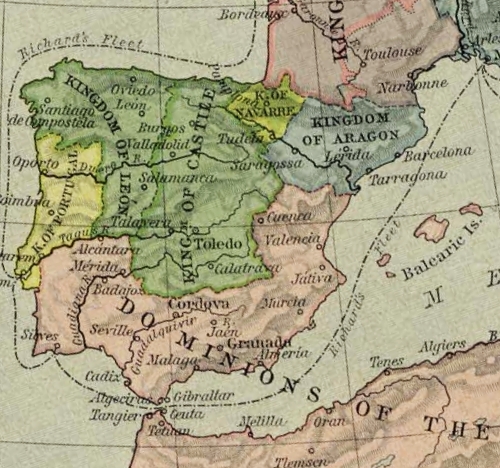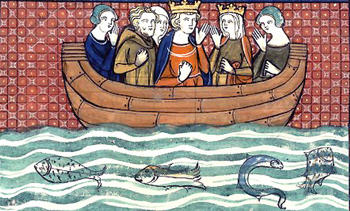by Susan Flantzer © Unofficial Royalty 2016

Effigy of Berengaria of Navarre; Photo Credit – Wikipedia
Berengaria of Navarre was the only English queen never to set foot in the country. Her husband King Richard I of England spent about only six months of his ten-year reign in England. There is evidence that she may have visited England in the years following his death when she was Queen Dowager. Berengaria was the fourth of the seven children of King Sancho VI of Navarre and Sancha of Castile, daughter of King Alfonso VII of León and Castile and his first wife Berengaria of Barcelona. The Kingdom of Navarre, originally the Kingdom of Pamplona, was a Basque-based kingdom that occupied lands on either side of the western Pyrenees Mountains, alongside the Atlantic Ocean between present-day Spain and France.

Navarre (light green) in 1190; Credit – Wikipedia
Berengaria was born around 1163 in Pamplona, the capital of Navarre. She had six siblings:
- King Sancho VII of Navarre (1154 – 1234), married (1) Constance of Toulouse, no issue, marriage annulled (2) identity of the second wife is disputed
- Ferdinand of Navarre (died circa 1207)
- Ramiro of Navarre, Bishop of Pamplona (died circa 1228)
- Constance of Navarre (died circa 1205)
- Blanche of Navarre, Countess of Champagne, Regent of Champagne, Regent of Navarre (died 1229), married Theobald III, Count of Champagne, had issue; Blanche acted as Regent of Champagne for her son, and as Regent of Navarre for her brother King Sancho VII of Navarre when he retired due to illness
- Theresa (died young)
Berengaria had met her future husband King Richard I of England years before their marriage at a tournament in Pamplona. When Richard became king in 1189, he was urged to marry and his thoughts turned to Berengaria. In the summer of 1190, Richard left to participate in the Third Crusade and asked his mother, Eleanor of Aquitaine, to go to Navarre and arrange his marriage with Berengaria, and then escort her to whatever point he reached on his way to the Crusades. In 1190, Eleanor met King Sancho VII in Pamplona and where he hosted a banquet in the Palacio Real de Olite in her honor. Richard had been betrothed for many years to Alys of France, sister of King Philippe II of France, so his betrothal to Berengaria could not be celebrated until he terminated his betrothal to Alys, which he did when he arrived in Messina, Sicily. Eleanor escorted Berengaria as far as Messina where she handed her over to her recently widowed daughter Joan, Queen of Sicily.
Richard and Berengaria were to have married in Sicily, but Richard postponed the wedding and set off for the Holy Land along with Berengaria and Joan who were on a separate ship. Two days after setting sail, Richard’s fleet was hit by a strong storm. Several ships were lost and others were way off course. Richard landed safely in Crete, but the ship Berengaria and Joan were on was marooned near Cyprus. Berengaria and Joan were about to be captured by the ruler of Cyprus when Richard’s ships appeared to rescue them. On May 12, 1191, King Richard I of England married Berengaria of Navarre at the Chapel of St George in Limassol, Cyprus, and then his fleet, along with Berengaria and Joan, traveled to the Holy Land. Berengaria and Richard’s marriage was childless.

Richard and Berengaria on the way from Cyprus to the Holy Land; Credit – Wikipedia
Berengaria and Joan accompanied Richard throughout the Crusade. Richard treated Berengaria courteously, but it is unknown if the marriage was ever consummated. The two women returned from the Holy Land before Richard, landed at Naples, and then proceeded to Rome where they had to stay for a year until the Pope gave them safe conduct to travel to Marseilles. Upon his return to Europe, Richard was held captive for two years by Leopold V, Duke of Austria and Henry VI, Holy Roman Emperor for an enormous ransom estimated to be worth around £2 billion at today’s prices. Berengaria remained in Europe, based at Beaufort-en-Vallée, in the County of Maine (now in France) attempting to raise money for his ransom. Eventually, Richard’s mother Eleanor arrived to arrange Richard’s release. After his release in 1194, Richard returned to England and was not joined by his wife.
In 1195, Richard returned to his French lands but made no attempt to rejoin Berengaria until a monk persuaded Richard that he should once again reunite with his wife. Richard and Berengaria spent Christmas of 1196 together in Poitiers. In March of 1199, Richard was suppressing a revolt by besieging a castle, the Château de Châlus-Chabrol in Châlus in the present-day Limousin region in western France. On the evening of March 25, 1199, Richard was walking the perimeter of the castle observing the trenches that were being dug. Not wearing his chainmail, Richard was hit by an arrow from a crossbow shot by a soldier on the castle battlements. Richard unsuccessfully tried to pull out the arrow and a doctor did a less than adequate job of treating the injury which became infected with gangrene. Richard’s mother, Eleanor of Aquitaine, arrived before Richard’s death. He died in his mother’s arms on April 6, 1199, at the age of 41.
After Richard’s death, Berengaria received the revenues of the tin mines in Devon and Cornwall in England, and the city of Le Mans, the capital of the County of Maine, was settled on her as dower, the provision accorded by law, but traditionally by a husband or his family, to a wife for her support in the event that she should survive her husband. In 1228, Berengaria founded the Cistercian Abbey of L’Epau near Le Mans and retired there. She died at the Abbey of L’Epau in Le Mans, County of Maine, now in France; on December 23, 1230, and was buried there in a magnificent tomb.

Tomb of Berengaria of Navarre at the Abbey of l’Epau; Credit – Wikipedia
This article is the intellectual property of Unofficial Royalty and is NOT TO BE COPIED, EDITED, OR POSTED IN ANY FORM ON ANOTHER WEBSITE under any circumstances. It is permissible to use a link that directs to Unofficial Royalty.
England: House of Angevin Resources at Unofficial Royalty
